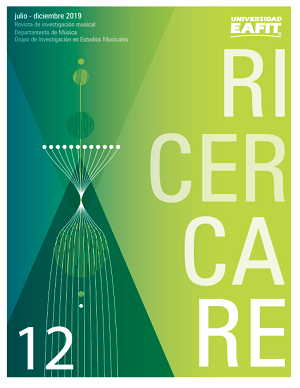Approaching new piano literature: composition and interpretation of four piano etudes
Main Article Content
Keywords
piano etudes, performance practice, new music,, piano composition
Abstract
In the literature for solo instrument, etudes typically present different kinds of technical and expressive challenges. In fact, they often focus on unique and problematic aspects of performance on a specific instrument. The short group of piano etudes presented here has the same purpose, although, in some cases, it recalls writing techniques and melodic-rhythmical modules usually associated with composers and styles of both the past and present times. In this article in particular, four etudes (Scales, Expressive Fingering, Parallel Thirds and Broken Octaves) are briefly described and analyzed from both a compositional and an interpretive approach, given the case that both the composer and the interpreter were in contact during the creative and learning process of the pieces. The result of this kind of collaboration is twofold: a composition whose playability and effectiveness are warranted by the practice of the interpreter, and a performance with a better understanding of the direct wishes of the composer.

